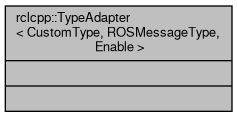Template structure used to adapt custom, user-defined types to ROS types. More...
#include <type_adapter.hpp>

Public Types | |
| using | is_specialized = std::false_type |
| using | custom_type = CustomType |
| using | ros_message_type = CustomType |
Detailed Description
struct rclcpp::TypeAdapter< CustomType, ROSMessageType, Enable >
Template structure used to adapt custom, user-defined types to ROS types.
Adapting a custom, user-defined type to a ROS type allows that custom type to be used when publishing and subscribing in ROS.
In order to adapt a custom type to a ROS type, the user must create a template specialization of this structure for the custom type. In that specialization they must:
- change
is_specializedtostd::true_type, - specify the custom type with
using custom_type = ..., - specify the ROS type with
using ros_message_type = ..., - provide static convert functions with the signatures:
- static void convert_to_ros(const custom_type &, ros_message_type &)
- static void convert_to_custom(const ros_message_type &, custom_type &)
The convert functions must convert from one type to the other.
For example, here is a theoretical example for adapting std::string to the std_msgs::msg::String ROS message type:
template<>
struct rclcpp::TypeAdapter<std::string, std_msgs::msg::String>
{
using is_specialized = std::true_type;
using custom_type = std::string;
using ros_message_type = std_msgs::msg::String;
static
void
convert_to_ros_message(
const custom_type & source,
ros_message_type & destination)
{
destination.data = source;
}
static
void
convert_to_custom(
const ros_message_type & source,
custom_type & destination)
{
destination = source.data;
}
};
The adapter can then be used when creating a publisher or subscription, e.g.:
using MyAdaptedType = TypeAdapter<std::string, std_msgs::msg::String>;
auto pub = node->create_publisher<MyAdaptedType>("topic", 10);
auto sub = node->create_subscription<MyAdaptedType>(
"topic",
10,
[](const std::string & msg) {...});
You can also be more declarative by using the adapt_type::as metafunctions, which are a bit less ambiguous to read:
using AdaptedType = rclcpp::adapt_type<std::string>::as<std_msgs::msg::String>; auto pub = node->create_publisher<AdaptedType>(...);
If you wish, you may associate a custom type with a single ROS message type, allowing you to be a bit more brief when creating entities, e.g.:
// First you must declare the association, this is similar to how you // would avoid using the namespace in C++ by doing `using std::vector;`. RCLCPP_USING_CUSTOM_TYPE_AS_ROS_MESSAGE_TYPE(std::string, std_msgs::msg::String); // Then you can create things with just the custom type, and the ROS // message type is implied based on the previous statement. auto pub = node->create_publisher<std::string>(...);
Definition at line 98 of file type_adapter.hpp.
Member Typedef Documentation
◆ custom_type
| using rclcpp::TypeAdapter< CustomType, ROSMessageType, Enable >::custom_type = CustomType |
Definition at line 101 of file type_adapter.hpp.
◆ is_specialized
| using rclcpp::TypeAdapter< CustomType, ROSMessageType, Enable >::is_specialized = std::false_type |
Definition at line 100 of file type_adapter.hpp.
◆ ros_message_type
| using rclcpp::TypeAdapter< CustomType, ROSMessageType, Enable >::ros_message_type = CustomType |
Definition at line 104 of file type_adapter.hpp.
The documentation for this struct was generated from the following file:
- smacc2_sm_reference_library/sm_husky_barrel_search_1/servers/opencv_perception_node/type_adapter.hpp